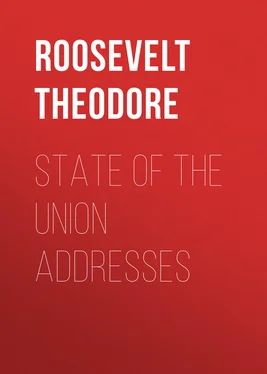Theodore Roosevelt - State of the Union Addresses
Здесь есть возможность читать онлайн «Theodore Roosevelt - State of the Union Addresses» — ознакомительный отрывок электронной книги совершенно бесплатно, а после прочтения отрывка купить полную версию. В некоторых случаях можно слушать аудио, скачать через торрент в формате fb2 и присутствует краткое содержание. Жанр: foreign_edu, Технические науки, Политика, на английском языке. Описание произведения, (предисловие) а так же отзывы посетителей доступны на портале библиотеки ЛибКат.
- Название:State of the Union Addresses
- Автор:
- Жанр:
- Год:неизвестен
- ISBN:нет данных
- Рейтинг книги:5 / 5. Голосов: 1
-
Избранное:Добавить в избранное
- Отзывы:
-
Ваша оценка:
- 100
- 1
- 2
- 3
- 4
- 5
State of the Union Addresses: краткое содержание, описание и аннотация
Предлагаем к чтению аннотацию, описание, краткое содержание или предисловие (зависит от того, что написал сам автор книги «State of the Union Addresses»). Если вы не нашли необходимую информацию о книге — напишите в комментариях, мы постараемся отыскать её.
State of the Union Addresses — читать онлайн ознакомительный отрывок
Ниже представлен текст книги, разбитый по страницам. Система сохранения места последней прочитанной страницы, позволяет с удобством читать онлайн бесплатно книгу «State of the Union Addresses», без необходимости каждый раз заново искать на чём Вы остановились. Поставьте закладку, и сможете в любой момент перейти на страницу, на которой закончили чтение.
Интервал:
Закладка:
Taking the work of the Army and the civil authorities together, it may be questioned whether anywhere else in modern times the world has seen a better example of real constructive statesmanship than our people have given in the Philippine Islands. High praise should also be given those Filipinos, in the aggregate very numerous, who have accepted the new conditions and joined with our representatives to work with hearty good will for the welfare of the islands.
The Army has been reduced to the minimum allowed by law. It is very small for the size of the Nation, and most certainly should be kept at the highest point of efficiency. The senior officers are given scant chance under ordinary conditions to exercise commands commensurate with their rank, under circumstances which would fit them to do their duty in time of actual war. A system of maneuvering our Army in bodies of some little size has been begun and should be steadily continued. Without such maneuvers it is folly to expect that in the event of hostilities with any serious foe even a small army corps could be handled to advantage. Both our officers and enlisted men are such that we can take hearty pride in them. No better material can be found. But they must be thoroughly trained, both as individuals and in the mass. The marksmanship of the men must receive special attention. In the circumstances of modern warfare the man must act far more on his own individual responsibility than ever before, and the high individual efficiency of the unit is of the utmost importance. Formerly this unit was the regiment; it is now not the regiment, not even the troop or company; it is the individual soldier. Every effort must be made to develop every workmanlike and soldierly quality in both the officer and the enlisted man.
I urgently call your attention to the need of passing a bill providing for a general staff and for the reorganization of the supply departments on the lines of the bill proposed by the Secretary of War last year. When the young officers enter the Army from West Point they probably stand above their compeers in any other military service. Every effort should be made, by training, by reward of merit, by scrutiny into their careers and capacity, to keep them of the same high relative excellence throughout their careers.
The measure providing for the reorganization of the militia system and for securing the highest efficiency in the National Guard, which has already passed the House, should receive prompt attention and action. It is of great importance that the relation of the National Guard to the militia and volunteer forces of the United States should be defined, and that in place of our present obsolete laws a practical and efficient system should be adopted.
Provision should be made to enable the Secretary of War to keep cavalry and artillery horses, worn-out in long performance of duty. Such horses fetch but a trifle when sold; and rather than turn them out to the misery awaiting them when thus disposed of, it would be better to employ them at light work around the posts, and when necessary to put them painlessly to death.
For the first time in our history naval maneuvers on a large scale are being held under the immediate command of the Admiral of the Navy. Constantly increasing attention is being paid to the gunnery of the Navy, but it is yet far from what it should be. I earnestly urge that the increase asked for by the Secretary of the Navy in the appropriation for improving the markmanship be granted. In battle the only shots that count are the shots that hit. It is necessary to provide ample funds for practice with the great guns in time of peace. These funds must provide not only for the purchase of projectiles, but for allowances for prizes to encourage the gun crews, and especially the gun pointers, and for perfecting an intelligent system under which alone it is possible to get good practice.
There should be no halt in the work of building up the Navy, providing every year additional fighting craft. We are a very rich country, vast in extent of territory and great in population; a country, moreover, which has an Army diminutive indeed when compared with that of any other first-class power. We have deliberately made our own certain foreign policies which demand the possession of a first-class navy. The isthmian canal will greatly increase the efficiency of our Navy if the Navy is of sufficient size; but if we have an inadequate navy, then the building of the canal would be merely giving a hostage to any power of superior strength. The Monroe Doctrine should be treated as the cardinal feature of American foreign policy; but it would be worse than idle to assert it unless we intended to back it up, and it can be backed up only by a thoroughly good navy. A good navy is not a provocative of war. It is the surest guaranty of peace.
Each individual unit of our Navy should be the most efficient of its kind as regards both material and personnel that is to be found in the world. I call your special attention to the need of providing for the manning of the ships. Serious trouble threatens us if we can not do better than we are now doing as regards securing the services of a sufficient number of the highest type of sailormen, of sea mechanics. The veteran seamen of our war ships are of as high a type as can be found in any navy which rides the waters of the world; they are unsurpassed in daring, in resolution, in readiness, in thorough knowledge of their profession. They deserve every consideration that can be shown them. But there are not enough of them. It is no more possible to improvise a crew than it is possible to improvise a war ship. To build the finest ship, with the deadliest battery, and to send it afloat with a raw crew, no matter how brave they were individually, would be to insure disaster if a foe of average capacity were encountered. Neither ships nor men can be improvised when war has begun.
We need a thousand additional officers in order to properly man the ships now provided for and under construction. The classes at the Naval School at Annapolis should be greatly enlarged. At the same time that we thus add the officers where we need them, we should facilitate the retirement of those at the head of the list whose usefulness has become impaired. Promotion must be fostered if the service is to be kept efficient.
The lamentable scarcity of officers, and the large number of recruits and of unskilled men necessarily put aboard the new vessels as they have been commissioned, has thrown upon our officers, and especially on the lieutenants and junior grades, unusual labor and fatigue and has gravely strained their powers of endurance. Nor is there sign of any immediate let-up in this strain. It must continue for some time longer, until more officers are graduated from Annapolis, and until the recruits become trained and skillful in their duties. In these difficulties incident upon the development of our war fleet the conduct of all our officers has been creditable to the service, and the lieutenants and junior grades in particular have displayed an ability and a steadfast cheerfulness which entitles them to the ungrudging thanks of all who realize the disheartening trials and fatigues to which they are of necessity subjected.
There is not a cloud on the horizon at present. There seems not the slightest chance of trouble with a foreign power. We most earnestly hope that this state of things may continue; and the way to insure its continuance is to provide for a thoroughly efficient navy. The refusal to maintain such a navy would invite trouble, and if trouble came would insure disaster. Fatuous self-complacency or vanity, or short-sightedness in refusing to prepare for danger, is both foolish and wicked in such a nation as ours; and past experience has shown that such fatuity in refusing to recognize or prepare for any crisis in advance is usually succeeded by a mad panic of hysterical fear once the crisis has actually arrived.
Читать дальшеИнтервал:
Закладка:
Похожие книги на «State of the Union Addresses»
Представляем Вашему вниманию похожие книги на «State of the Union Addresses» списком для выбора. Мы отобрали схожую по названию и смыслу литературу в надежде предоставить читателям больше вариантов отыскать новые, интересные, ещё непрочитанные произведения.
Обсуждение, отзывы о книге «State of the Union Addresses» и просто собственные мнения читателей. Оставьте ваши комментарии, напишите, что Вы думаете о произведении, его смысле или главных героях. Укажите что конкретно понравилось, а что нет, и почему Вы так считаете.












